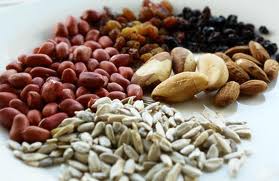Nourishing Your Mind: Exploring Foods Beneficial for Mental Health
Filed under Foods & Excercise, Home Remedies

The connection between what we eat and our overall well-being extends beyond physical health. Research has shown that certain foods possess properties that can positively impact our mental health, enhancing cognitive function, mood, and overall well-being. This essay aims to introduce and explore a range of foods that are beneficial for nurturing a healthy mind.
The Mind-Food Connection
The food we consume plays a vital role in supporting brain function and mental health. Several key nutrients and compounds found in certain foods have been linked to improved cognitive performance and emotional well-being.
Omega-3 Fatty Acids:
Foods rich in omega-3 fatty acids, such as fatty fish (salmon, mackerel, sardines), walnuts, flaxseeds, and chia seeds, have been associated with improved cognitive function and reduced risk of mental decline. Omega-3 fatty acids are essential for brain health and are believed to promote neurotransmitter function and reduce inflammation.
Antioxidant-Rich Fruits and Vegetables:
Colorful fruits and vegetables, such as berries, spinach, kale, tomatoes, and bell peppers, are abundant in antioxidants. These compounds help protect the brain from oxidative stress, reduce inflammation, and promote healthy blood flow, thus supporting brain health and reducing the risk of mental decline.
Whole Grains:
Incorporating whole grains like oats, brown rice, quinoa, and whole wheat bread into our diet can provide a steady release of glucose, the primary energy source for the brain. This helps maintain optimal cognitive function and stabilizes mood by preventing blood sugar fluctuations.
Probiotic-Rich Foods:
Foods containing probiotics, such as yogurt, kefir, sauerkraut, and kimchi, contribute to a healthy gut microbiome. Emerging evidence suggests that a balanced gut microbiome positively influences brain function, mood regulation, and may reduce the risk of mental health disorders.
Nuts and Seeds:
Nuts and seeds, including almonds, walnuts, pumpkin seeds, and sunflower seeds, are excellent sources of vitamin E, healthy fats, and various minerals. These nutrients have been associated with improved cognitive function and a reduced risk of age-related cognitive decline.
The Impact of Healthy Eating on Mental Well-being
Consuming a diet rich in mind-nourishing foods can have a profound impact on mental well-being. Here are some potential benefits:
Improved Mood:
Certain foods promote the production of neurotransmitters like serotonin, which regulates mood. Incorporating foods such as bananas, dark chocolate, and chickpeas can boost serotonin levels, promoting feelings of happiness and well-being.
Enhanced Cognitive Function:
A well-balanced diet provides the necessary nutrients to support optimal brain function. Foods rich in antioxidants, omega-3 fatty acids, and vitamins B, C, and E can enhance cognitive abilities, memory, and concentration.
Reduced Risk of Mental Health Disorders:
While a healthy diet cannot prevent mental health disorders entirely, it may reduce the risk and severity of conditions such as depression and anxiety. Nutrient-rich foods can support brain health, reduce inflammation, and provide the foundation for overall mental well-being.
Incorporating Mind-Nourishing Foods into Your Diet
Adopting a diet that promotes mental health does not have to be complicated. Here are some practical tips:
Emphasize Plant-Based Foods:
Prioritize a variety of fruits, vegetables, whole grains, and legumes in your meals. Experiment with different colors, flavors, and textures to make it enjoyable.
Include Healthy Fats:
Incorporate sources of omega-3 fatty acids like fatty fish, flaxseeds, and walnuts into your diet. Use olive oil and avocados for cooking and salad dressings.
Snack Smartly:
Replace processed snacks with nuts, seeds, and fresh fruits. These options provide essential nutrients and keep you satiated between meals.
Stay Hydrated:
Drink sufficient water throughout the day to support optimal brain function and prevent dehydration, which can negatively impact mood and cognitive performance.
Seek Professional Guidance:
If you have specific dietary needs or concerns, consult with a registered dietitian or healthcare professional who can provide personalized recommendations.
Nourishing your mind through a balanced and mindful approach to nutrition can have a profound impact on your mental well-being. By incorporating foods rich in omega-3 fatty acids, antioxidants, probiotics, and essential nutrients, you can support brain function, enhance cognitive abilities, and promote a positive mood. Remember, a healthy mind begins with nourishing your body with the right foods.
